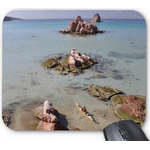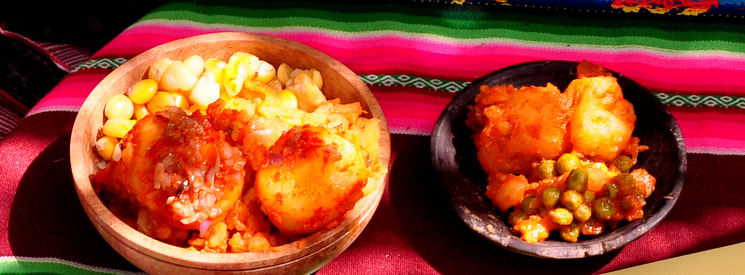
Before beginning a new stage with the bikes, we have the opportunity to go to Chataquila, a village in the Cordillera de los Frailes, to attend a cultural festival. We decide to go by truck with the locals. To do this we ask for a taxi to go to the "truck station". We ask the hotel to call a radio taxi to make sure that it is a legitimate cab, but in an oversight, the receptionist goes out to the street and flags down the first one that passes by. Making the mistake of jumping in, we become witnesses (and almost victims) of one of the classic scams to rob tourists and, in some cases, kidnap them for a few days to empty their bank accounts with daily cash withdrawals. The plot is simple. The driver radios his accomplices, and with some code lets them know he has victims. They follow the taxi that takes you to a remote area and there occurs the robbery or kidnapping. It´s more frequent on passengers going to the airport, just when they have with them all their belongings. Perhaps this was the reason nothing happened to us. In our case, a car follows us almost since our driver gives notice by radio, but he insists he is not going to the airport. The car follows us for a while, but we are in the direction to where we have asked, so we currently have no complaints. We make sure our taxi driver knows that we know the route we should be following to avoid any detour. Shortly before reaching our destination, the car stops and 2 guys from the car following us get close to ours. They talk to the driver half in Quechua, half in Castilian, but we do not understand a word. When we ask our driver what´s going on, he tells us they are policemen dressed as civilians, the classic lie so you don´t suspect that they're going to rob you. They look at us from the outside. Perhaps also the almost empty backpack we carry has helped us. After a short while they leave, the taxi keeps going for about 50 yards to the truck station and he drops us off there. It is still strange, because the cab at all times has followed a logical path and at the truck stop there is even police. We think it was a misunderstanding between the driver, who initially thought we were good victims but changed his mind during the trip, and his pals since they continued to follow us. In short, we have probably been very lucky. The fault is ours to jump on that unreliable taxi.
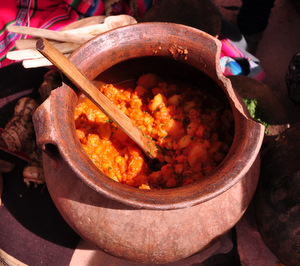 Once at the truck stop, we ask around and get in one, but it does not leave until it is full. That is a vague and subjective concept. According to the driver, it seems it is never full enough. When we depart, we are compressed like sardines in a can and lucky to have our 2 feet on the ground, even if it´s under other feet or bags of vegetables. In fact the policeman present at the truck station will not let us leave for safety reasons, but he opposes little resistance to travelers’ complaints and we just leave. For some reason 3 trucks leave simultaneously and they pass each other continuously as we drive on a dusty mountain track.
Once at the truck stop, we ask around and get in one, but it does not leave until it is full. That is a vague and subjective concept. According to the driver, it seems it is never full enough. When we depart, we are compressed like sardines in a can and lucky to have our 2 feet on the ground, even if it´s under other feet or bags of vegetables. In fact the policeman present at the truck station will not let us leave for safety reasons, but he opposes little resistance to travelers’ complaints and we just leave. For some reason 3 trucks leave simultaneously and they pass each other continuously as we drive on a dusty mountain track.
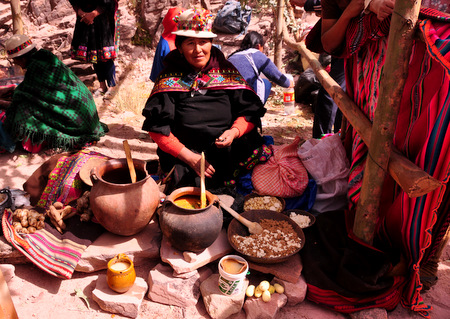 After an hour of involuntary pushes and clinging to the truck overhead beams we arrive at the shrine where the festival is celebrated. There is a stage where folk groups will perform and another area where there are food stalls. The latter do not want to sell their products yet, until the jury goes around and give them points for the contest. However, we can get a couple of corn breads to calm the hunger. We check the booths accompanying a reporter who is interviewing the cooks and Judit, almost inadvertently, acts as if she is one too. Some even ask her to take pictures of them. So she can make good close-ups without having to ask permission every time. After finishing the tour we try some of the dishes, although we have some difficulties to maintain a minimum of hygiene, as the local share plates and spoons. There is an assortment of soups, cheese dishes with quinoa (Phiri), empanadas of various kinds, sour corn, various dishes with ají, purple corn beer, etc... Most dishes are cooked in clay pots over a fire improvised on the spot. Every cook has a sign with her name, origin and the dishes exposed for tasting. All wear the traditional costumes of the area.
After an hour of involuntary pushes and clinging to the truck overhead beams we arrive at the shrine where the festival is celebrated. There is a stage where folk groups will perform and another area where there are food stalls. The latter do not want to sell their products yet, until the jury goes around and give them points for the contest. However, we can get a couple of corn breads to calm the hunger. We check the booths accompanying a reporter who is interviewing the cooks and Judit, almost inadvertently, acts as if she is one too. Some even ask her to take pictures of them. So she can make good close-ups without having to ask permission every time. After finishing the tour we try some of the dishes, although we have some difficulties to maintain a minimum of hygiene, as the local share plates and spoons. There is an assortment of soups, cheese dishes with quinoa (Phiri), empanadas of various kinds, sour corn, various dishes with ají, purple corn beer, etc... Most dishes are cooked in clay pots over a fire improvised on the spot. Every cook has a sign with her name, origin and the dishes exposed for tasting. All wear the traditional costumes of the area.
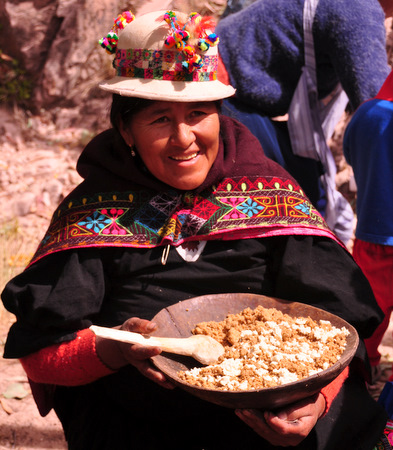 After a couple of hours we've already been through the food section and on the stage there is nothing going on yet. After a while something is happening but it´s mostly an endless list of names and organizations giving them thanks for being involved in the event. We decide to return back to Sucre, but it is not going to be easy. Trucks and buses do not leave until the festival is over and that will not probably be until 3 or 4 hours more. The cars are fully loaded or don´t go to Sucre. We have to wait some movilidad going back, but none is passing. Once we give up, we see that one of the authorities from the tourist office has already given his speech and gets on his pick-up with a driver waiting for him to return. We ask if they can take us and the answer is yes. What a difference! Now we are sitting on comfortable leather seats with air conditioning.
After a couple of hours we've already been through the food section and on the stage there is nothing going on yet. After a while something is happening but it´s mostly an endless list of names and organizations giving them thanks for being involved in the event. We decide to return back to Sucre, but it is not going to be easy. Trucks and buses do not leave until the festival is over and that will not probably be until 3 or 4 hours more. The cars are fully loaded or don´t go to Sucre. We have to wait some movilidad going back, but none is passing. Once we give up, we see that one of the authorities from the tourist office has already given his speech and gets on his pick-up with a driver waiting for him to return. We ask if they can take us and the answer is yes. What a difference! Now we are sitting on comfortable leather seats with air conditioning.
Go to top
© 2014 Explore Pangea. All Rights Reserved. Website
Terms
of Use.





